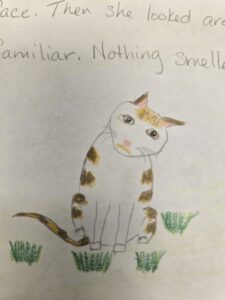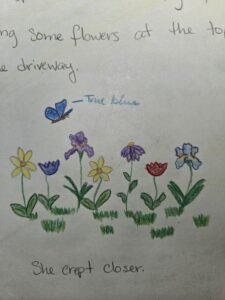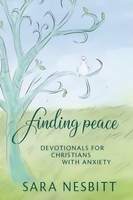In 2020, we had a little scare. My husband and younger daughter had been going in and out of the house, and suddenly I realized that I hadn’t seen Sassy, the girls’ cat, in a while. She had been known to slip out and take a little walk on the wild side before, and I was worried that she had again.
We looked everywhere for her. My husband and daughters combed through the neighborhood looking and calling for her. Meanwhile, we had looked in closets, under furniture, behind furniture… everywhere that a small cat could hide. They had been out for about half an hour with no sign of Sassy at all. I thought to look under our bed one more time. As I laid on my stomach beside our bed and raised the dust ruffle, up popped a pair of white-tipped ears. I’d found her!
That launched some thoughts: What if she had slipped out? What if Sassy, pampered housecat that she was, had gotten to go on an adventure in the outdoors? The story practically wrote itself. I sat down to type it, and 1200 words came flowing out, following Sassy’s inquisitive sniffing of fresh, outside air that led her to slipping out, all the way to her using her nose once more to lead her back home to be with her people.
There was one small problem, though. While I can write stories, the images that go with them live in my head, and I don’t have the artistic talent to get those images out of my head and onto paper. Hannah is willing to do the illustrations, but how do I convey to her what is in my head without us both getting hella frustrated?
Peter came up with the solution: “Why don’t you draft out a storyboard?” Holy shit, was that a great idea! After conferring with Hannah about finished book size, I cut down a stack of printer paper to scale and started sketching. Hannah laughed at some of my earlier attempts. Hey, if nothing else, I can do color blending with my beloved Prismacolor pencils, no problem.
It took about 2-3 weeks to get the storyboard done. I only worked on it during the week and for no more than an hour at a shot. And, surprisingly, I got better at drawing. Take a peek and tell me what you think.



Keep coming back here for updates on this book. I was hoping for a holiday 2025 launch, but that’s not going to be possible given Hannah’s schedule.

